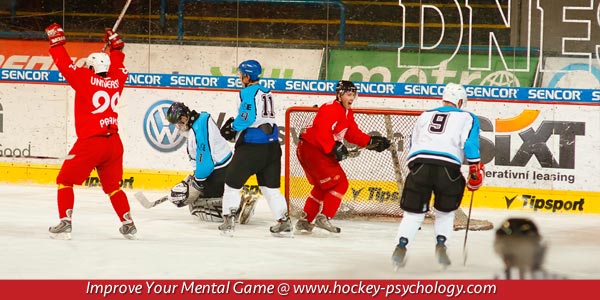What Makes Up a Strong Mental Game?
Would you rather be a favorite to win or be the underdog–heading into a championship game? Being favored implies you have more ability than your opponent and, let’s be honest…
Who wouldn’t want to have more natural talent? Unfortunately, more ability doesn’t guarantee victory. Winning is a team effort that requires team members to have a strong mental game.
A strong mental game can give you an edge and take you from “underdog” to “top dog.”
A strong mental game consists of strong belief in your ability to achieve a desired result, the ability to focus your attention on the process, and high trust in your skills.
A strong mental game allows teams to overcome a stronger opponent or favorite.
I was happy to see that Union College won its first NCAA hockey title Saturday night, rebounded from a 2-1 deficit and scored three times in a 1:54 span in the first period.
Union never relinquished the lead en route to a 7-4 victory over Minnesota.
Union College is a small liberal arts school in Schenectady, New York. My brother, Marty Cohn, attended Union College back in the late 70s where he played on both the hockey and football team. He would have been thrilled to learn that Union won the NCAA Championship.
Four facts highlight the extraordinary nature of the Dutchmen’s victory
- Union college has an enrollment of only 2,241 students,
- Union competes at the Division III level in all other sports except for hockey,
- Union offers no athletic scholarships, and
- Union was competing with only one drafted player on their squad.
How did the “underdog” Dutchmen become NCAA champions? Union’s strong belief in their skills, teamwork, and style of play made the difference.
Union defenseman Shayne Gostisbehere emphatically stated, “We’re national champions… I don’t think anyone will call us Cinderella anymore.”
Mat Bodie, the Union captain stated the team learned to focus on the present moment with the help of their sport psychologist:
“Just one shift at a time… This is the biggest game of our lives, hands down, but you’ve got to treat it like any other game. It was tough, I had people texting me, people calling me and stuff, and, you know, it was real tough to keep that mindset, but with our sport psychologist we were able to get that done.”
Even when down 2-1 during the first period, Bodie said the Dutchman remained confident and focused on their game:
“I don’t think much changed. We didn’t change our game plan. We tightened it up a little defensively… We just wanted to stick with our process. We felt we were playing pretty well and, you know, great things happen.”
You, too, can beat a favored team if you are committed to doing the physical and mental work
- Don’t allow the people around you to say you can’t win against Goliath.
- Keep your head in the game until the horn sounds. A small change in momentum can change the fate of the final score in your favor.
- Devise a winning game plan, have faith in your game plan, and stay committed to it.
Improve your mental toughness with one-on-one mental coaching with Dr. Cohn.
Related Articles on Hockey Mental Game:
- Wayne Gretzky on The Mental Game of Hockey
- Your Mental Game and Self-Intimidation
- Your Mental Game and Self-Intimidation
*Subscribe to The Sports Psychology Podcast on iTunes
*Subscribe to The Sports Psychology Podcast on Spotify
Mental Coaching Programs for Hockey
Our mental game coaching programs for hockey players helps athletes improve confidence, concentration, let go of errors quickly, and stay composed during crunch-time. Read more about sports psychology for hockey players at Peaksports.com
Please contact me by phone at 888-742-7225 or by filling out the webform below to learn more about our personal mental training programs for hockey players or teams:

Leave a Reply